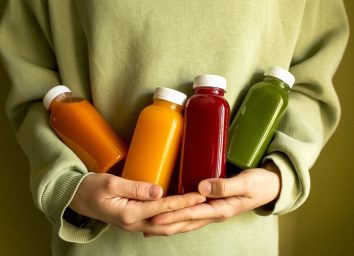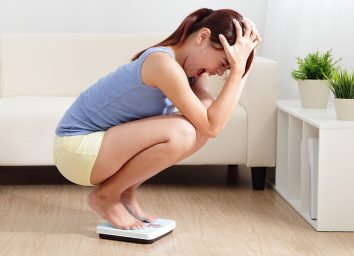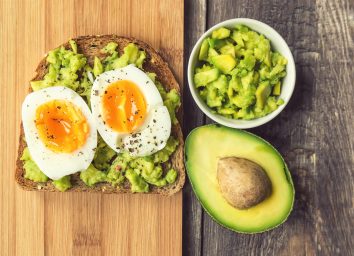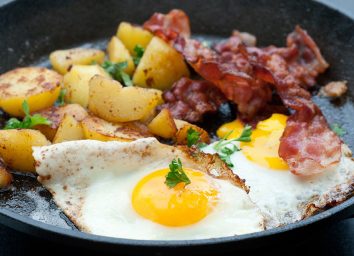38 Tips You Must Follow to Lose Weight, Say Dietitians
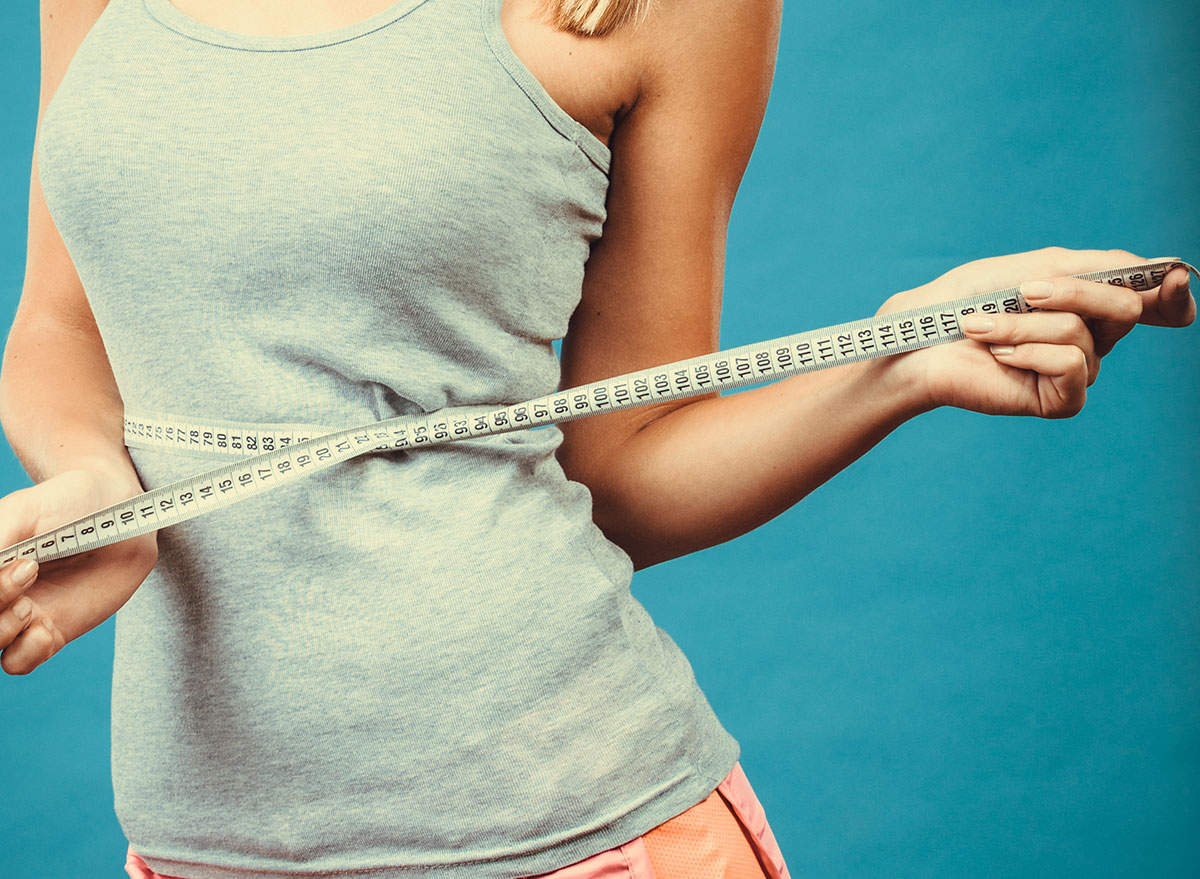
Just like a pair of jeans, there's no one size that fits all when it comes to losing pounds. So rather than compiling a list of exactly what you should eat and avoid or sharing when to eat to lose weight, we tapped dietitians to share how to lose weight with their most practical, effective, and easy-to-implement advice.
Each weight-loss tip on this list is more about a lifestyle change and building a long-term habit rather than a crazy detox trick or diet "hack." (P.S.: If any diet "promises weight loss of more than three pounds per week, restricts food groups, or requires that you purchase specific foods or supplements," abandon ship, says Julie Upton, MS, RD, a San Francisco-based registered dietitian.)
Here, we asked dietitians for their timeless, tried-and-true tips for how to lose weight that will help you end your battle with the scale once and for all. Read on, and for more on how to lose weight, you won't want to miss The Best Ways to Lose Belly Fat for Good, Say Doctors.
Focus more on well-being than weight.

Rather than focusing on a number on a scale, select a feeling or a wellness outcome—for example, to lower LDL cholesterol or be able to bike around your local park—as your goal, suggests Suzanne Dixon, MPH, MS, RD, a dietitian and epidemiologist with Cambia Health Solutions.
"In our vanity-obsessed world, it's tough to let go of using the number on the scale as a guide around 'optimal' body size and health. However, research is pretty clear that people who focus on health-related goals when aiming to improve dietary habits are much happier and more likely to lose weight than people who obsess overreaching a very specific number on the scale," she says.
Evaluate your reasons.

Then write them down. "It's best to have concrete, long-term motives that relate to how you see yourself as a person for losing weight, rather than focusing on short-term events," Dixon says. "Missions like 'I want to lose weight for my 10-year class reunion,' or 'I need to drop inches to go on that cruise,' are short-term and will never give your new, 'healthy you' behavior changes a chance of sticking."
Instead, try: "I see myself as a healthy, fit and engaged person who wants to live a long, high-quality life for my family and friends," she says.
Stay well-fueled.

Eat consistently throughout the day to avoid a dangerous and unhealthy starve-binge cycle, suggests Rachel Fine, MS, RD, a registered dietitian nutritionist and owner of the nutrition counseling firm To The Pointe Nutrition. "Long stretches between meals can leave you hangry! In that case, you're less likely to mindfully eat and thus more to eat past fullness," Fine says.
Upton adds that a normalized meal pattern, with three meals and two snacks, puts you on a path to better maintain a healthy calorie balance because you won't get ravenous or graze all day. Consider these 14 Healthy Snacks That Will Actually Make You Feel Full for your mini meals.
Set a schedule.
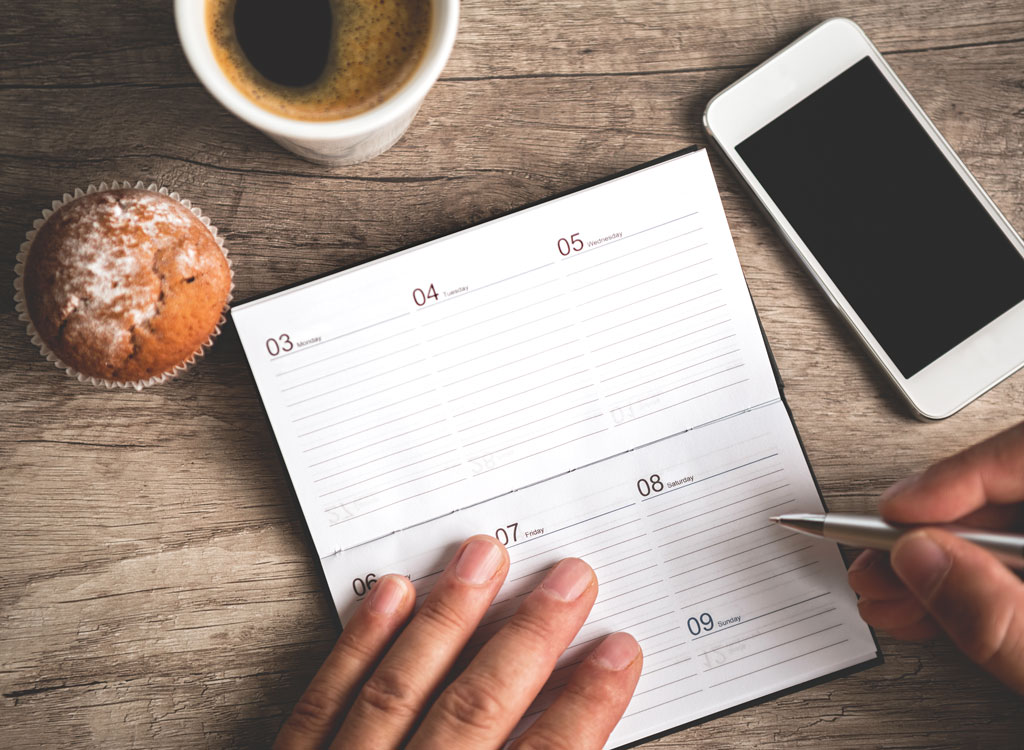
To stick to that five-a-day eating pattern, "build an eating schedule and stick to it," says Ashley Reaver, RD, a registered dietitian at Ashley Reaver Nutrition LLC. "Aim to eat every three to four hours and stick to the schedule. This way, food does not happen to you, but rather you have some control over your food choices. Not every meal will be perfect, and that's more than okay, but creating 'guardrails' on your diet can help to make those less-than-ideal meals way less frequent." (Steal weight-loss-friendly meal ideas from this flat-belly meal plan.)
Keep a food journal.
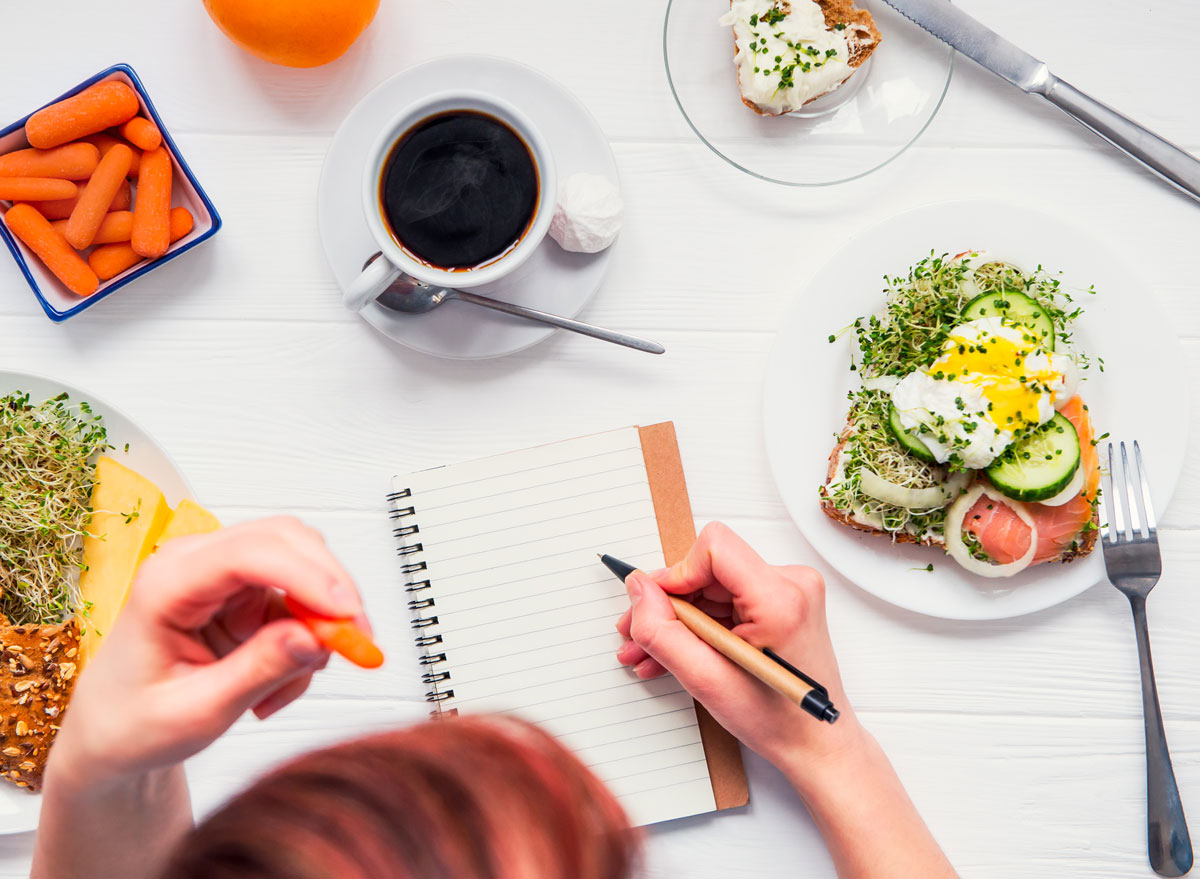
Track your drinks, too, so nothing you savor or sip is done mindlessly. Check out our expert guide to food journaling for weight loss for a comprehensive how-to.
"Write down everything you eat and drink. Studies show that those who log what they eat lose more weight and are more likely to keep it off," Upton says.
Related: The Expert Guide to Keeping a Food Journal for Effective Weight Loss
Aim to balance each meal and snack.
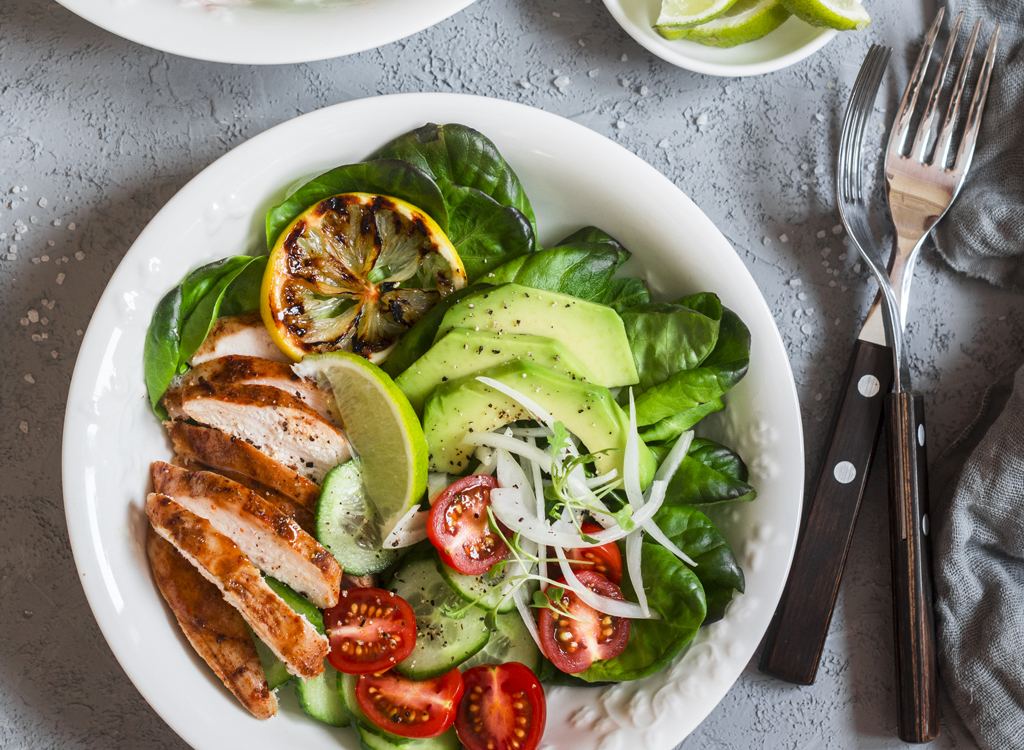
Perhaps you've heard of the IIFYM (If It Fits Your Macros) diet? Fine recommends that all macros can fit, and you should aim for a flexible blend of carbohydrates, fat, and protein.
"In every meal and snack, seek a balance of the three macronutrients: complex carbs, healthy unsaturated fats, and lean protein. Yes, that means you might need to break your fear of carbs or fat. Both have important roles in the body and when restricted, hormonal changes result in increased cravings. Carbs are critical for the body, providing the most efficient form of fuel, especially for exercise. Fat regulates hormones and helps us to feel satisfied," Fine says.
Make choices, not rules.
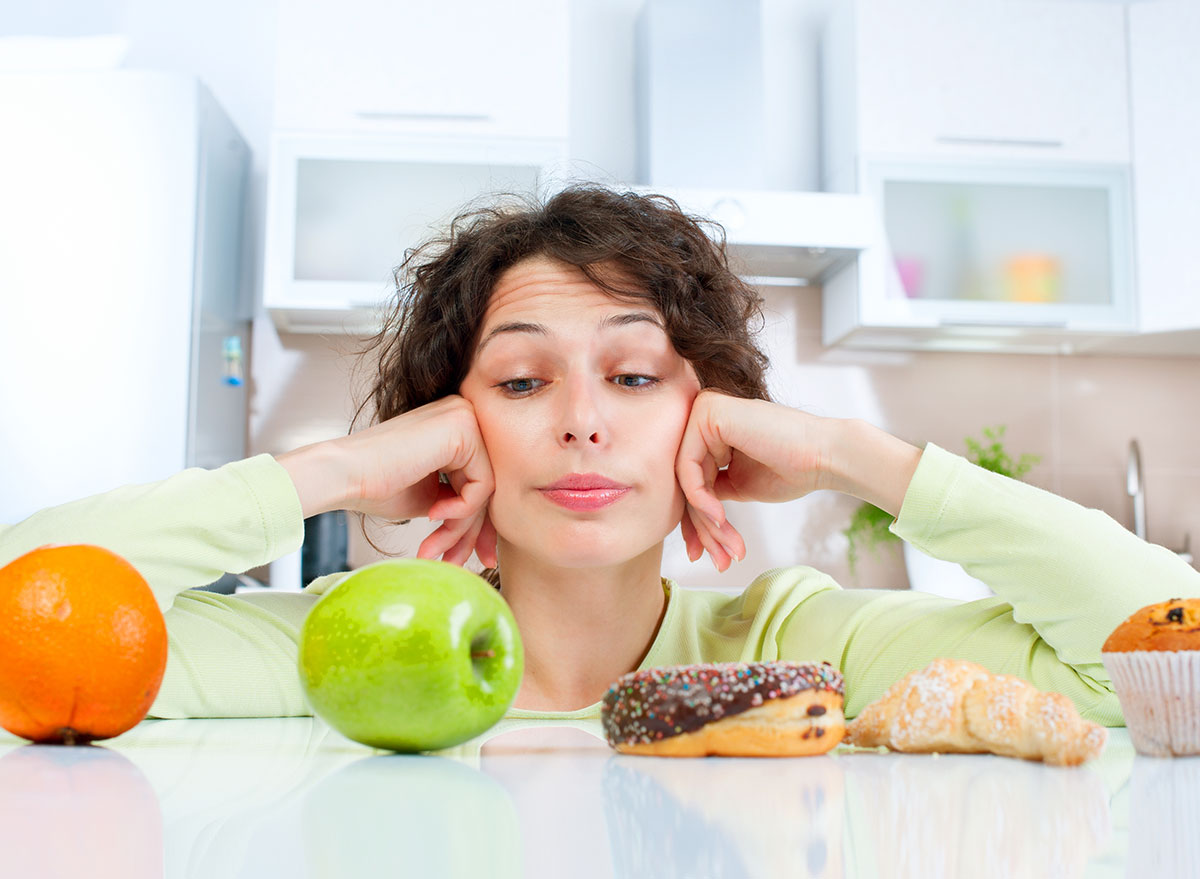
There is no "good" food or "bad" food. Take note and opt for foods that support your weight-loss goals and make your body feel good as often as possible.
"Many studies have proven that food restrictions drive overeating. For example, with sugar, we feel intense cravings are a symptom of addiction. However, these cravings result from the moral value placed on sweets in our society. When sweets are placed on the 'forbidden' list, we subconsciously want them since we think we can't have them," Fine says.
Get rid of the restrictive mindset.

Similarly, focusing too much on what you're skipping rather than what you have the opportunity to enjoy can make a healthy lifestyle feel a bit too much like punishment. "Consider an inclusive approach, rather than a restrictive approach," Fine says. "An 'eat less' frame of mind can set you up for a cycle of guilt when unfair expectations are not met due to the biological consequences of food restrictions, such as those increased cravings we talked about earlier."
Step up your walking routine.

Physical activity doesn't have to be done at the gym to "count" or be beneficial. Exercise need not be torture, Reaver says. Find easy activities and time frames that you can commit to. "Seek out two or three 15-minute breaks throughout the day to walk," Reaver says. "Moving your body is a very important way to lose and maintain weight. Not only does it burn calories, but it also helps develop lean muscle mass, benefits cardiovascular health and mobility, and is important for mood."
Increase the amount of water you're drinking.

Add one glass of water right after you wake up, one glass before lunch, and another glass before dinner, Brooking suggests. "Staying hydrated can help you manage your appetite. Plus, if you've fallen short on your hydration needs through the day, having a plan to get these three glasses of water into your daily routine will help you make up any shortfalls on your fluid needs," she says. If you need some extra motivation, here's what happens to your body when you don't drink enough water.
Get enough sleep.

How much you snooze plays a big role in how easily it is to slim down. "Nearly everyone needs at least seven to eight hours of sleep each night. Consistently getting less than seven hours of sleep results in low energy. Our body responds to low energy by producing cannabinoids, the same compounds that produce the munchies. Scoring enough sleep is one easy way to cut down on snacking throughout the day," Reaver says.
RELATED:
Avoid crash diets.
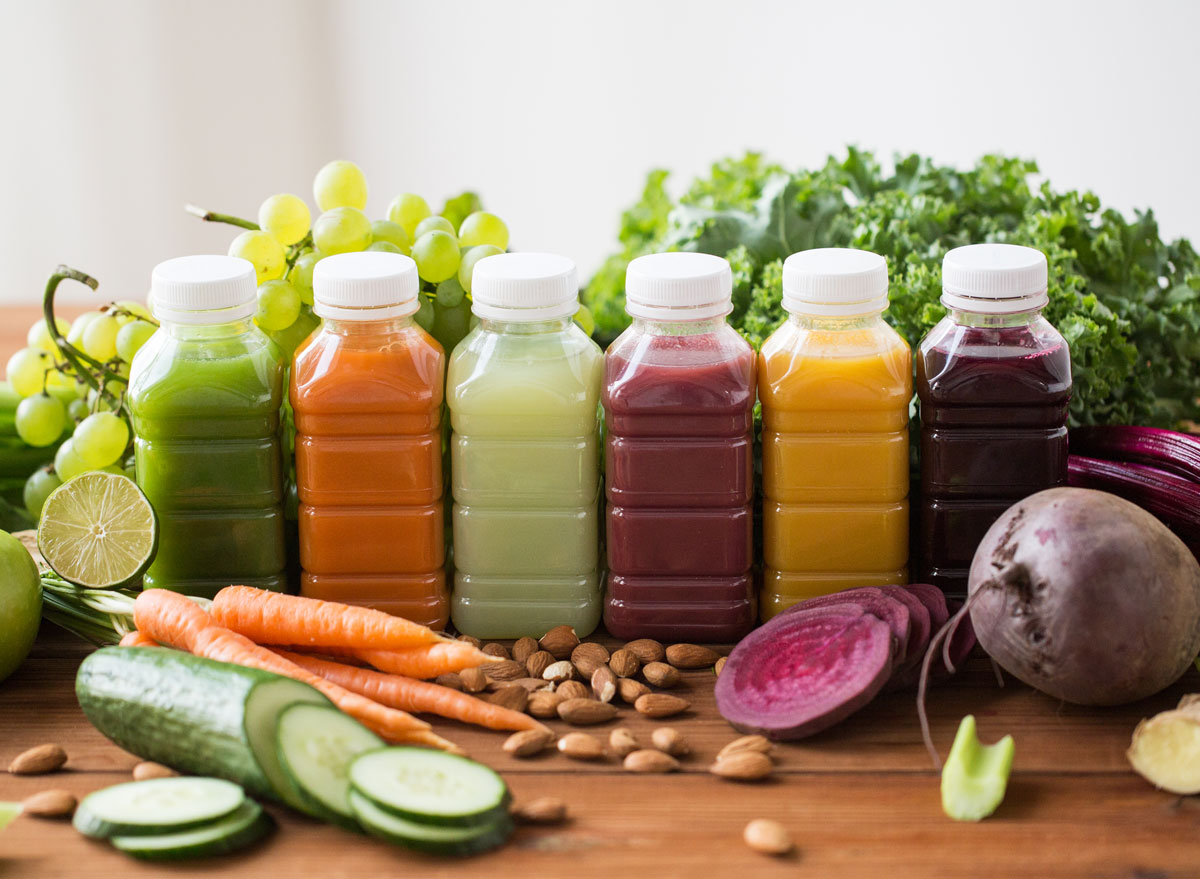
Cutting calories to extremes on a crash diet equals a recipe for a rebound. "For long-term health, avoid losing weight too rapidly. A recent study in the Journal of the American Medical Association found that severe caloric restriction resulting in rapid weight loss also led to more loss of bone and muscle in postmenopausal women compared with women following a more reasonable calorie-restriction approach and slower weight loss," Dixon says.
Opt for a sustainable diet plan.
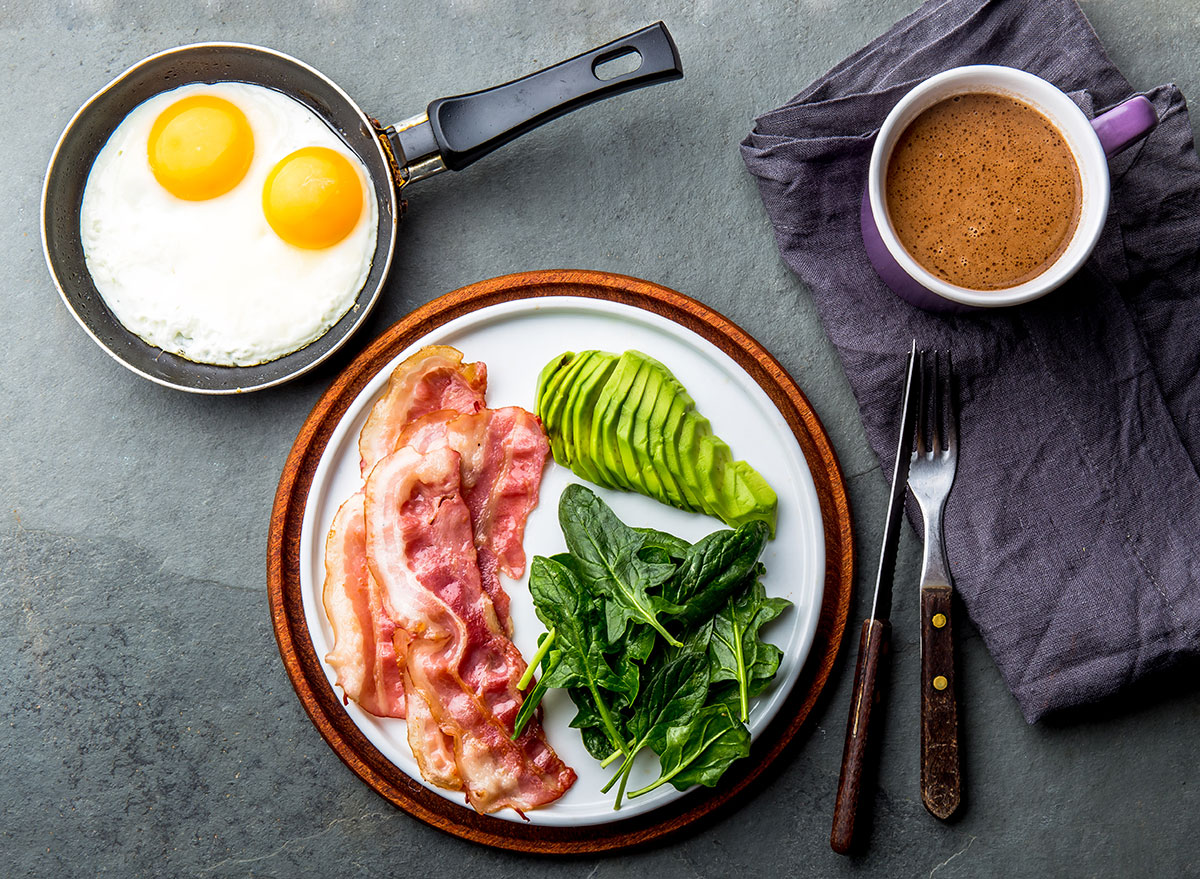
If you can't imagine doing some version of this diet plan for the rest of your life, it's not going to be healthy or sustainable. "This doesn't mean you need to follow the plan to the letter for the rest of your life, it just means the overall framework of the diet must be an enjoyable and sustainable way for you to eat to yield lasting results," Dixon says.
For example, you might follow a very strict low-carbohydrate diet to lose weight, then add back in small amounts of carbs during the weight maintenance phase. You'll make the diet a bit more flexible over time, but you still need to be comfortable with keeping total carb intake low forever more. If you're on Team Ciabatta and can't imagine being low-carb for the rest of your life, this isn't the plan for you.
"The comprehensive eating pattern has to be acceptable and manageable for you for a lifestyle. Don't think of it as a quick fix," she says.
When it's time to eat, focus on eating.
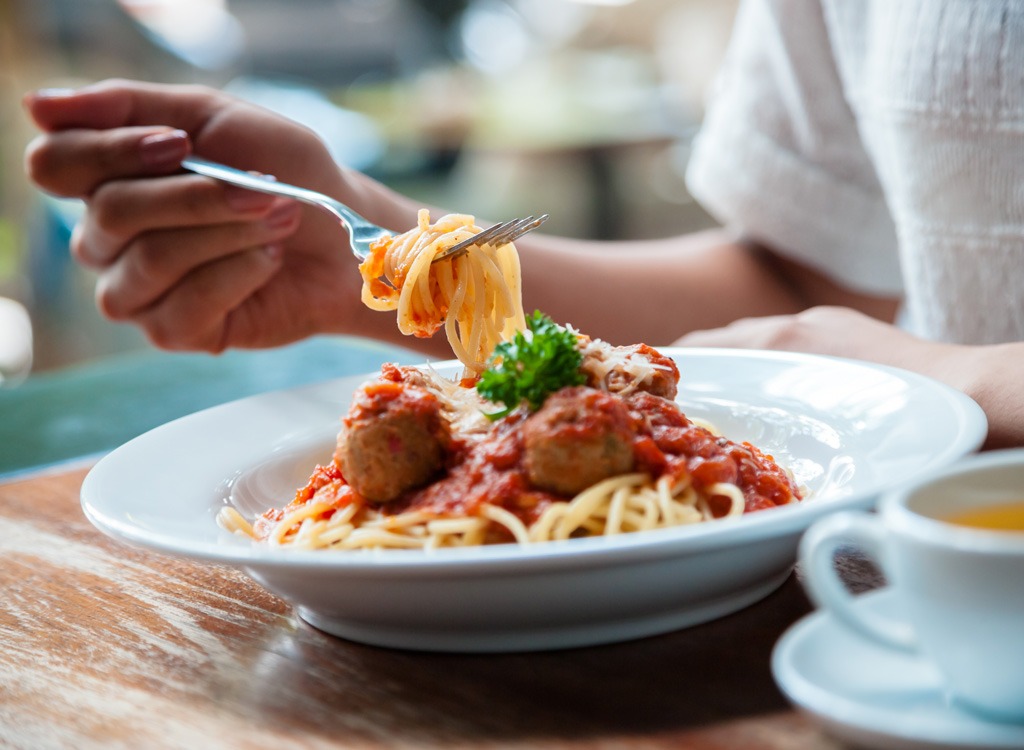
It's tempting to scroll through Instagram or watch the news while eating breakfast, but try to make mealtime a focused affair, recommends Katherine Brooking, MS, RD, a registered dietitian in San Francisco, and the co-founder of the nutrition news company Appetite for Health.
"When you eat, eat. Don't read, watch TV or do anything else. Being mindful of what you're eating and how full you fill will help teach you better hunger-management skills," she says.
Don't ban your favorite foods.

Allow for space for your favorites; sweet or savory. Just adjust the remainder of your day accordingly. "Diets won't work for the long run if you deprive yourself of your favorite foods. You can enjoy indulgences if they're planned for and accounted for as part of your diet," Brooking says. "If I know I'm going to have my mom's Chocolate Buttercream Cake for dessert, I will make sure I eat a balanced but light breakfast, lunch, and dinner to allow for a 500-calorie-a-slice cake afterwards. Remember the 'Ps' of weight loss: Plan, Prepare and Practice."
The same holds true if you have a reservation at the best Italian restaurant in town for date night. Go ahead and split the gnocchi if you love it, just fuel up with oatmeal and a couple eggs for breakfast and a grilled salmon-topped salad for lunch, for example.
Focus on addition, not subtraction.
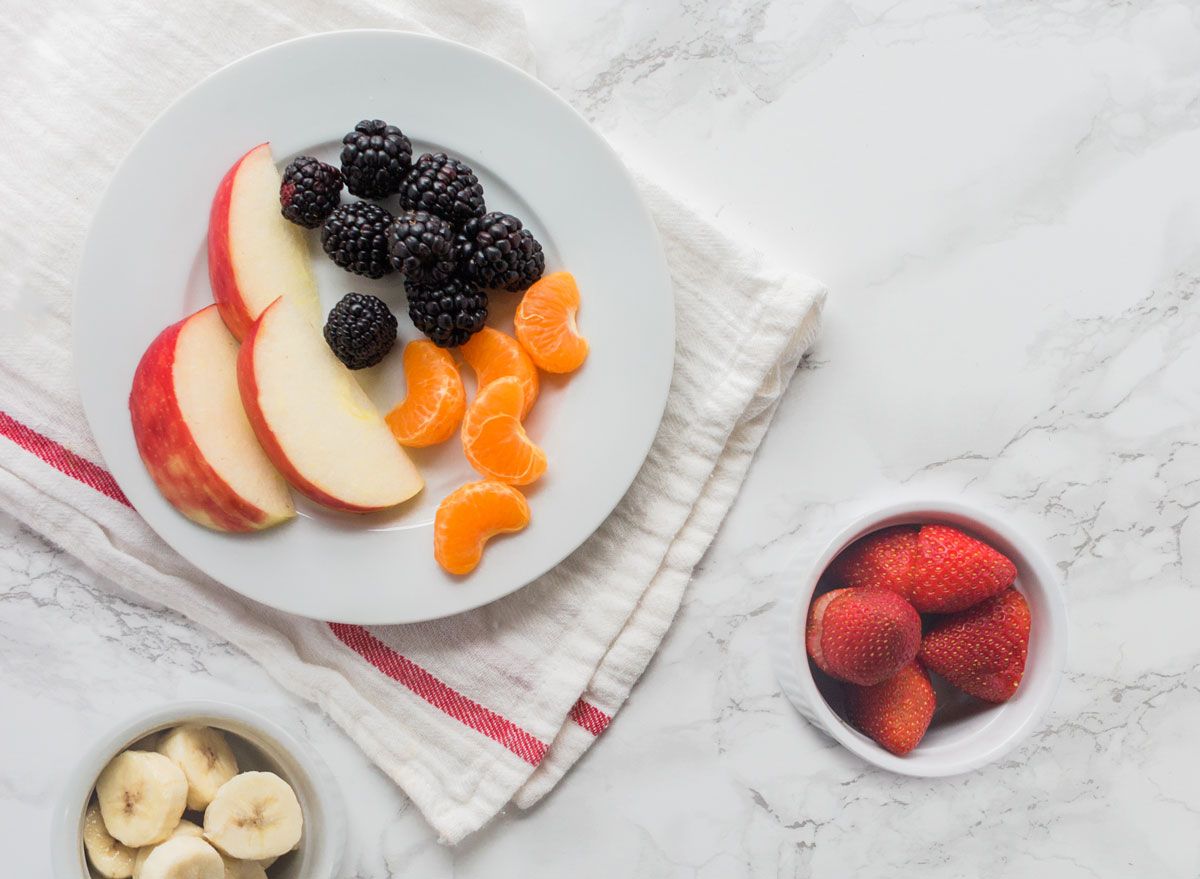
Instead of zeroing in on all the things you can't have on a healthy eating plan, focus on adding in all the great foods that are part of the plan.
"A deprivation-based model causes our brains to crave the very things we are trying to eliminate. Instead, a model that focuses on adding in the healthy components can help you feel empowered," Dixon says. "For example, maybe your new eating plan includes eating seven servings of different fruits and vegetables every day. All the effort you put into incorporating more healthy things—blueberries or mangoes, fresh or frozen—can keep your brain on a positive track. That way, you end up not missing the things you want to limit when you're preoccupied with adding new foods into the diet."
Plus, when you load up on these nutrition-rich foods, you have less room for the not-so-nutritious things. "Many people find when they include the legumes, vegetables, fruit, nuts and whole grains that make up a healthful diet, they really are full and don't feel as much urge to visit the candy dish," Dixon says.
Fill up on real fiber, not the fake stuff.
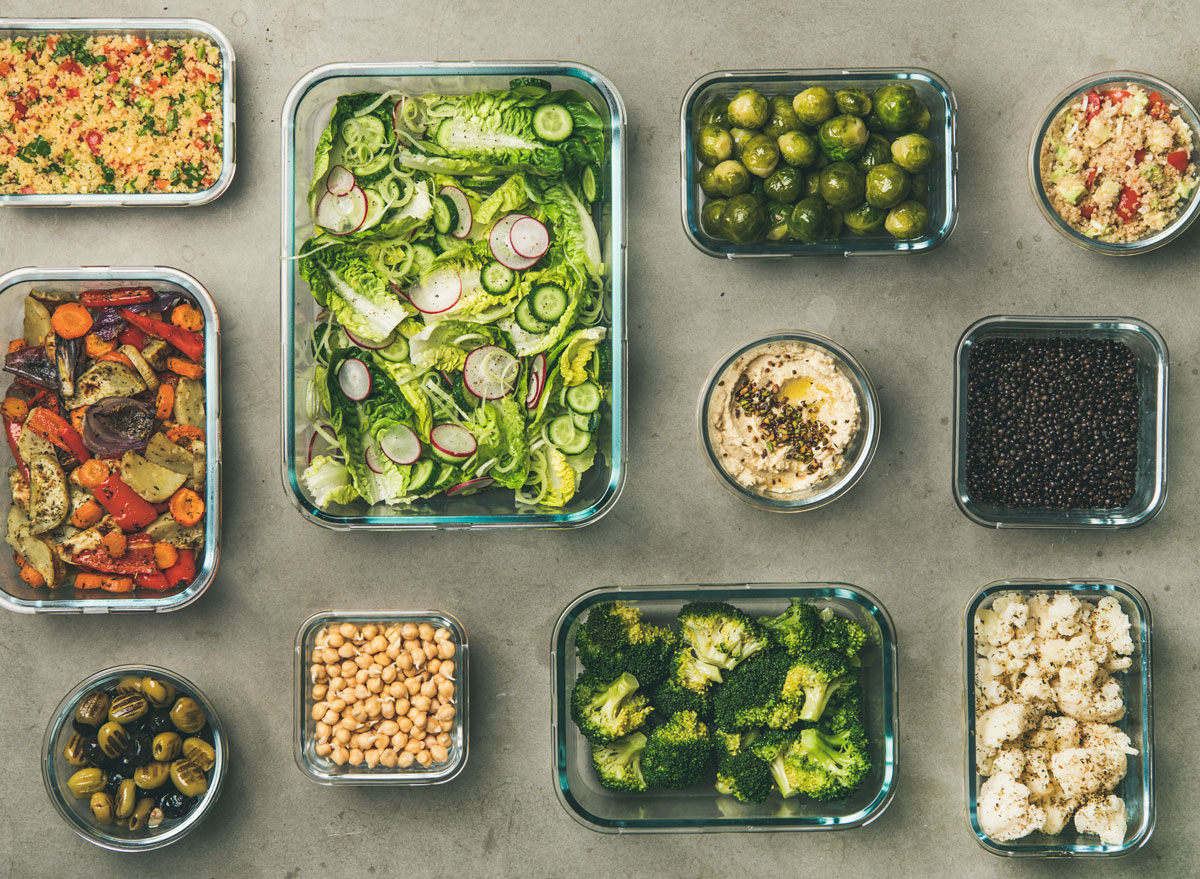
Plant-based eating not only lessens your load on the environment, but it also makes it easier to eat healthier and stick to a reasonable calorie count for the day.
"Add more plant-based, minimally-processed, carbohydrate-containing foods to your meal plan. Examples include vegetables, fruit, legumes, beans, nuts, seeds, and grains. Options like farro, barley, oats, wheat berries, buckwheat are high in naturally-occurring fibers and offer significantly more nutrition per bite," Fine says.
Unlike fiber-boosted foods like ice cream, protein bars, and powders, which have little research behind their effectiveness and health-improving qualities. "Processed fibers lack additional nutrients and bioactive substances found in naturally-occurring high-fiber foods," Fine adds.
Eat when you're active.

By that, we mean fuel up when your body needs the gas. "Eat during your busy hours of the day," says Lauren Harris-Pincus, MS, RDN, founder of Nutrition Starring YOU and author of The Protein-Packed Breakfast Club. "Just like a car needs gas on the road, not in the garage, our bodies need more energy during daylight hours and slow down to prepare for sleep when the sun goes down. When eating on the couch late at night, those calories will not be used as efficiently as those consumed earlier in the day. Try to stop eating at least about three hours before bed."
Plan meals when you're not hungry.
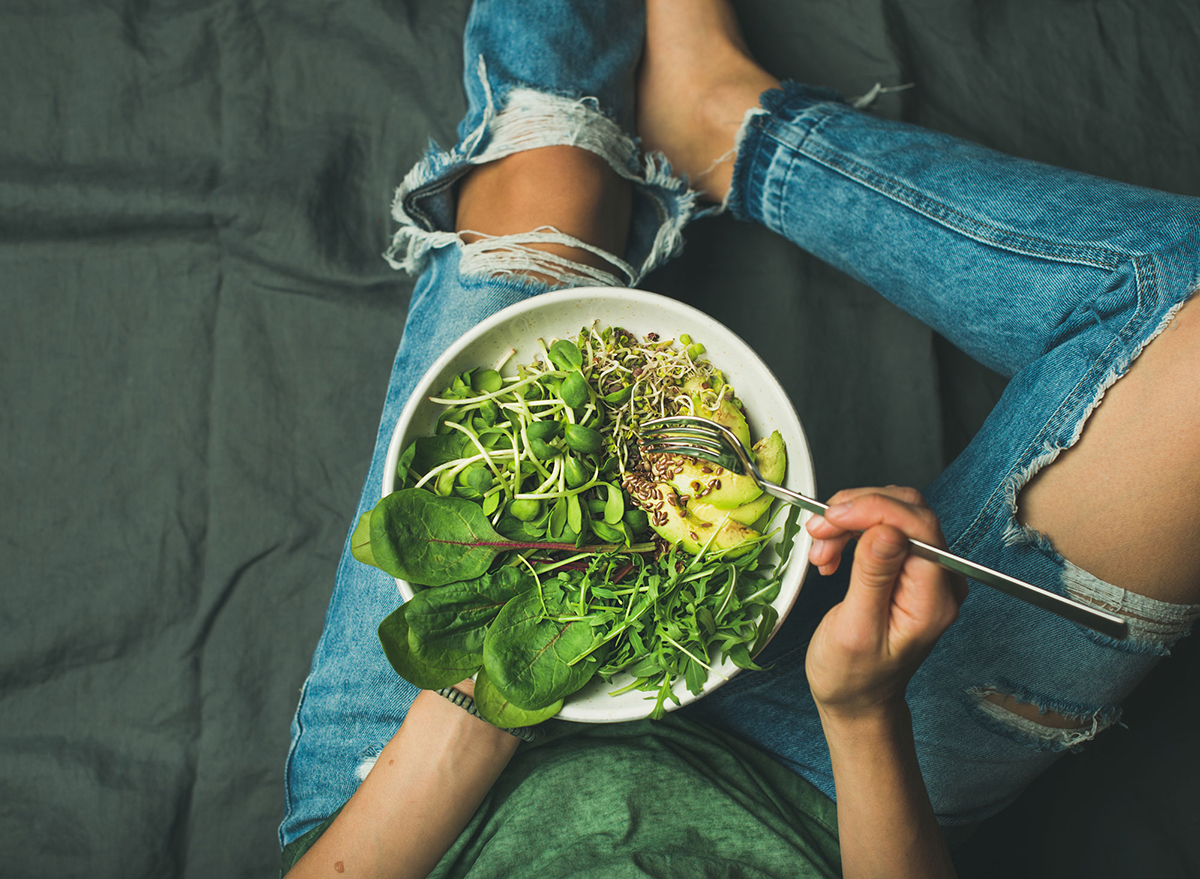
Chow down on breakfast, then set your game plan for the day. "Research shows that people who ordered their lunch a few hours early ordered less food than those who chose right before lunch when they were already hungry. It's way easier to eat a balanced diet when you plan ahead, especially during those hectic dinner hours," says Harris-Pincus.
Cook more meals at home.
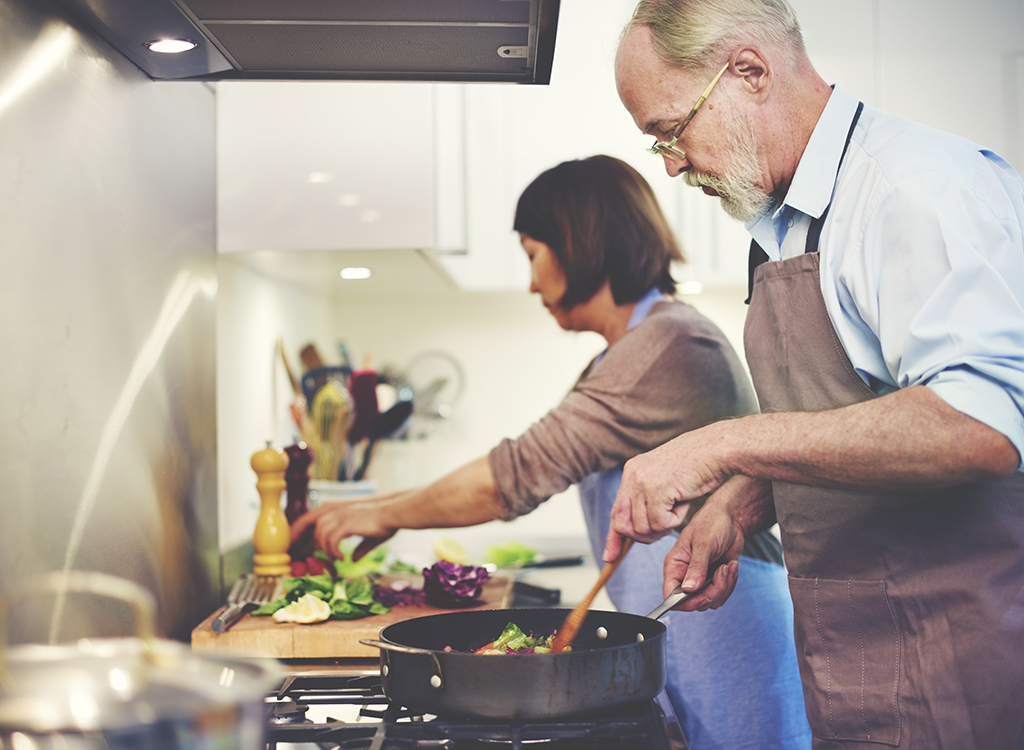
Cooking at home is one of the best things you can do to control your fat and calorie intake. Restaurants want you to come back, so chefs often pile on more butter, oil, and salt than you would at home.
"Making meals at home is the best way for you to know what you're eating," Reaver says.
Upton continues: "Reams of research show that the more meals you eat away from home, the more overweight you're likely to be. And, it doesn't matter if you frequent five-star or fast food restaurants."
Give yourself some grace.
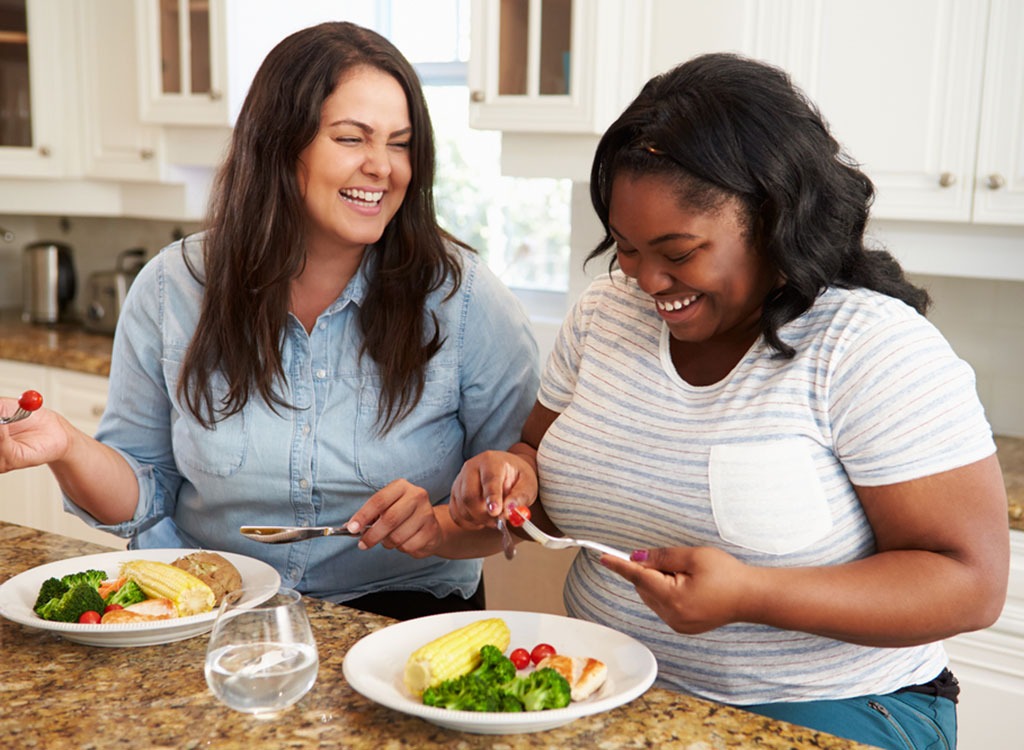
Contrary to what you may have seen on The Biggest Loser, 10 pounds are not going to fall off in one week. "Be easy on yourself," Fine says. "Dieting standards are unfair because we are not biologically equipped to under-fuel our body. In diet culture, we are conditioned to think that this failure to resist is solely a sign of weakness or a loss of willpower. However, food restrictions are what drive overeating, not your loss of—or lack of—willpower."
Evaluate any diet trends using common sense.
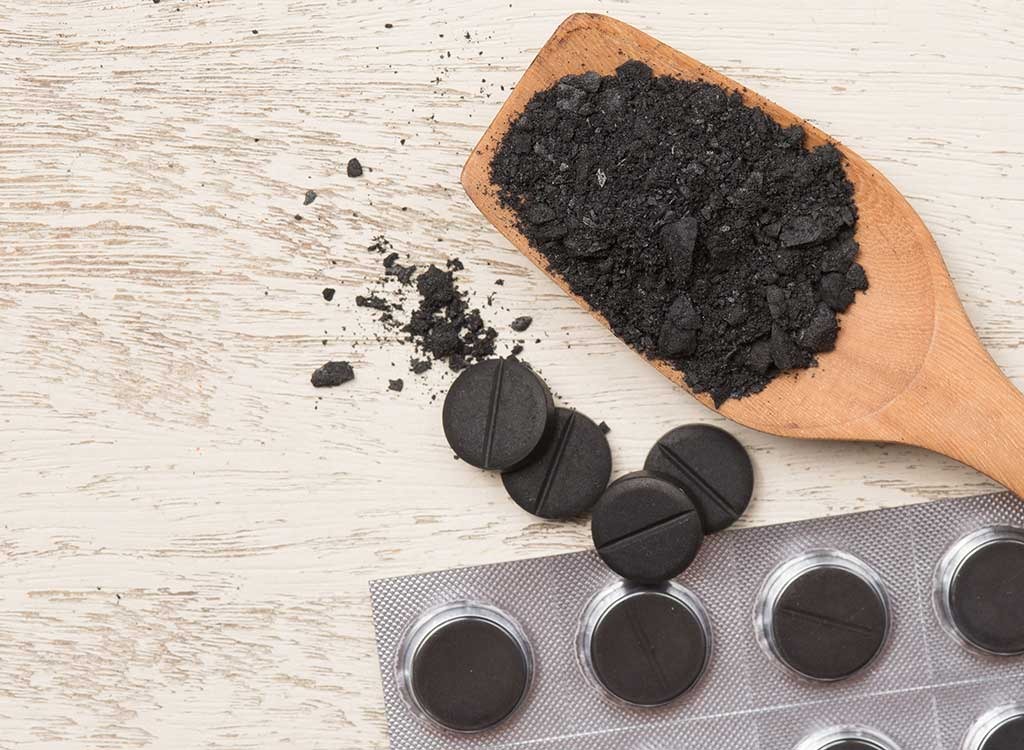
Don't eat produce grown under the ground? Bypass beans? That doesn't seem quite right… "If a diet tells you to eliminate foods that are very important to you culturally, that's another 'rule' that common sense suggests you should ignore. Fortunately, most foods with deep cultural importance can fit into a healthy diet. For example, I am not aware of any cultural or ethnic food patterns supportive of eating cream-filled processed cupcakes and candy bars, and that's good," Dixon says. "On the flip side, many cuisines from around the world include legumes and any diet that says, 'no legumes' to a person of Greek, Mediterranean, Asian, Latin American, or Middle Eastern descent just may not be feasible."
Eat a balanced breakfast with at least 20 grams of protein.
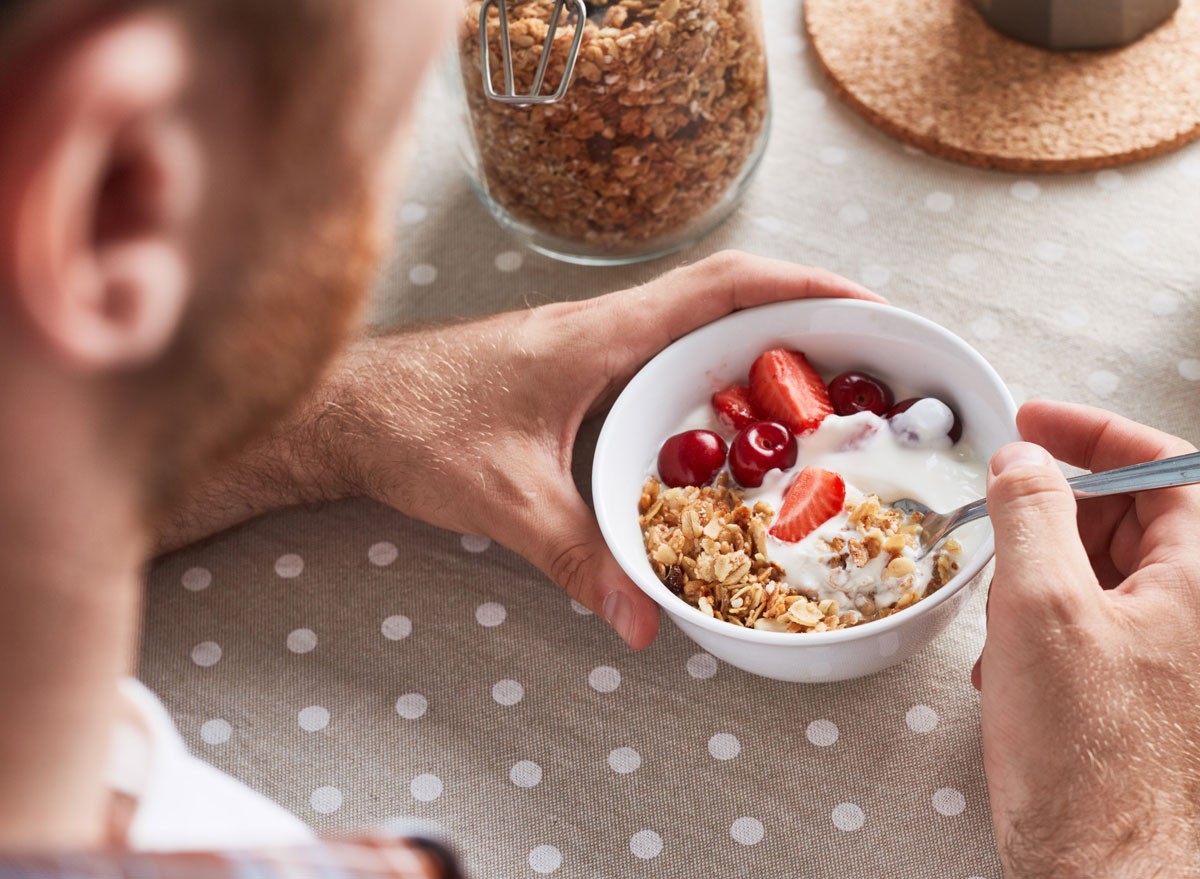
Go ahead, put an egg on it. "Most of us eat enough total protein in a day but we don't distribute it properly," Harris-Pincus says. "Consuming adequate protein in the morning can help to prevent muscle loss that comes with aging, plus it keeps you full longer and helps to prevent snacking later in the day."
Upton adds is a strong proponent of protein, too, and believes, "This is the most satisfying nutrient. It's a great idea to start your day with a protein-rich first meal to ward off cravings. Studies show that people who eat egg-based breakfasts are less likely to overeat during the day compared to those who start their day with bagels or other carb-rich first meals."
Give yourself permission to enjoy indulgences.
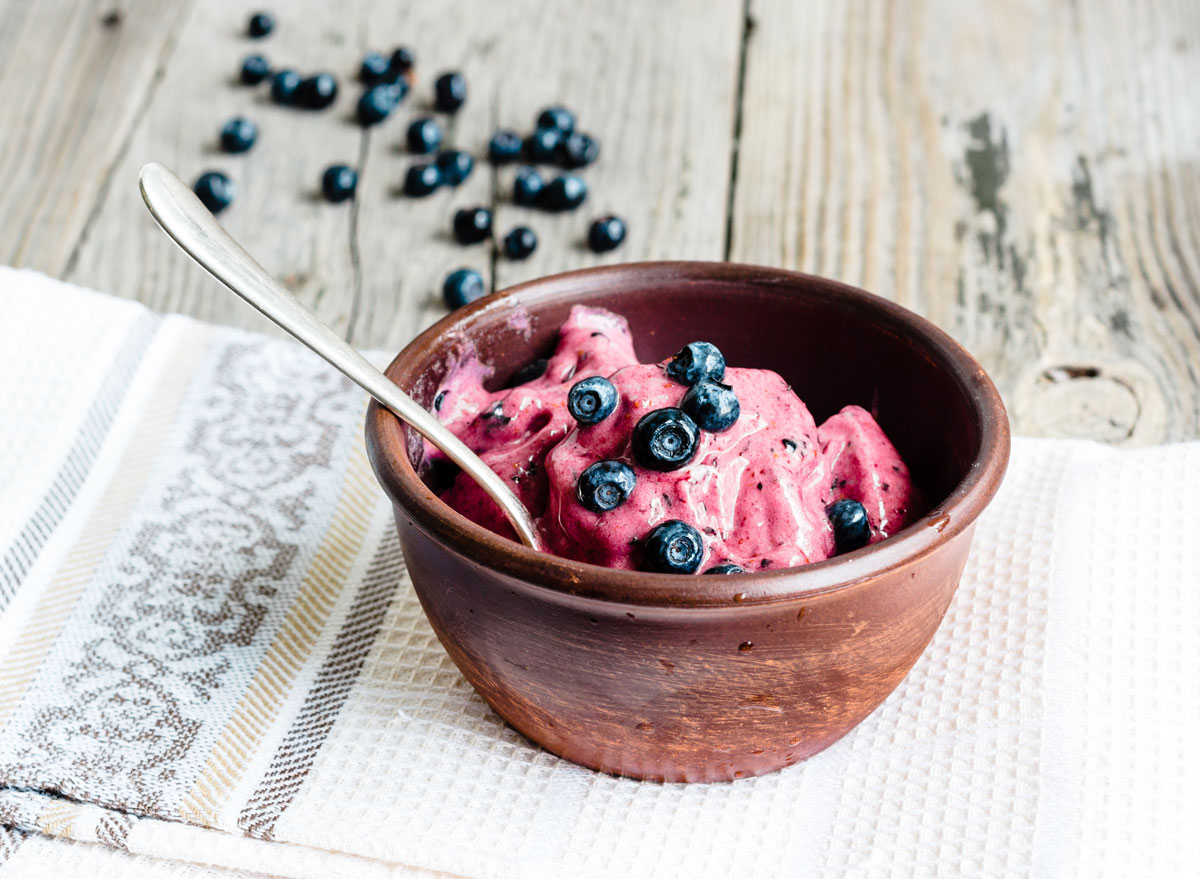
It's okay to crave both Brussels sprouts and brownies! "Once we grant ourselves unconditional permission to eat our favorite foods, we relieve the weight of responsibility that these foods hold over us," Fine says.
Make your own breakfast.
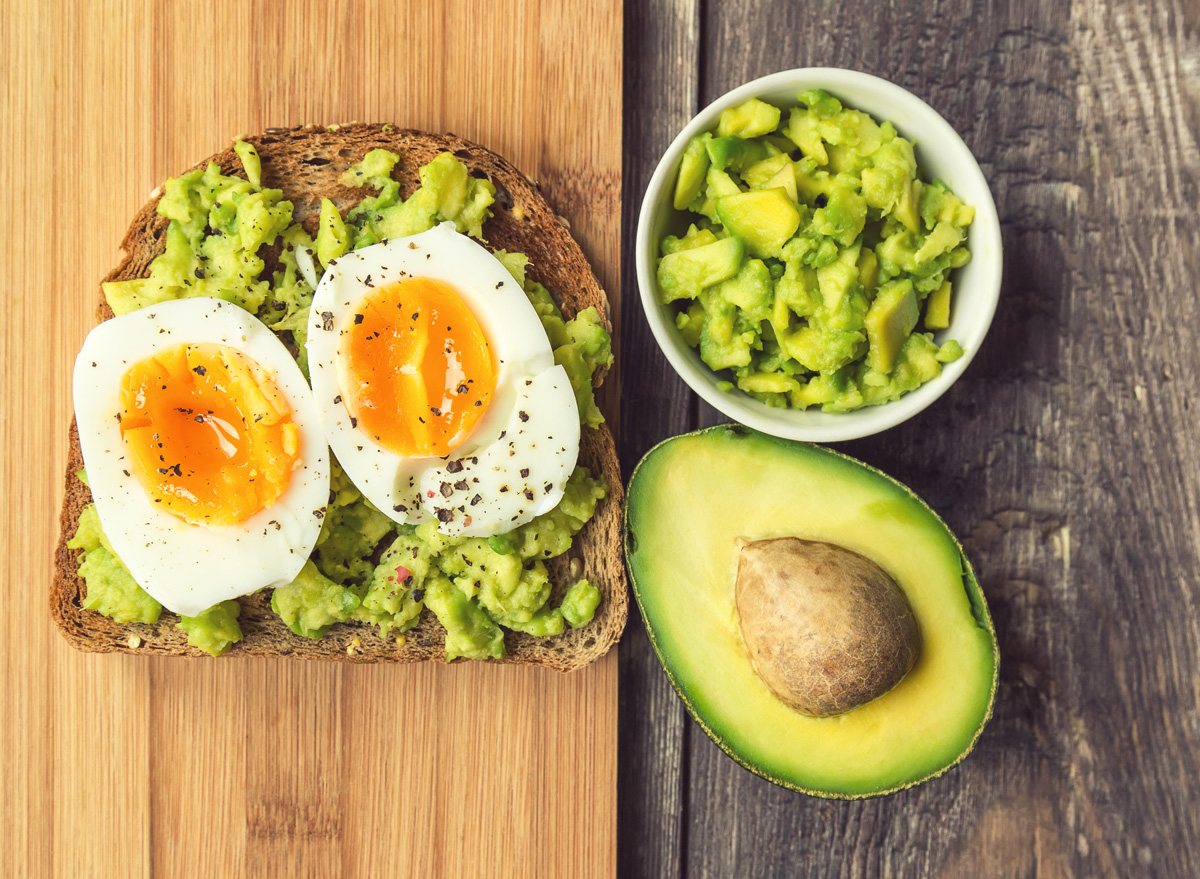
Kick off the day with a homemade dish. "Of all three meals, breakfast is the one we can most easily control. Start your day with a balanced meal where you control the ingredients," Reaver says.
Pack emergency snacks.
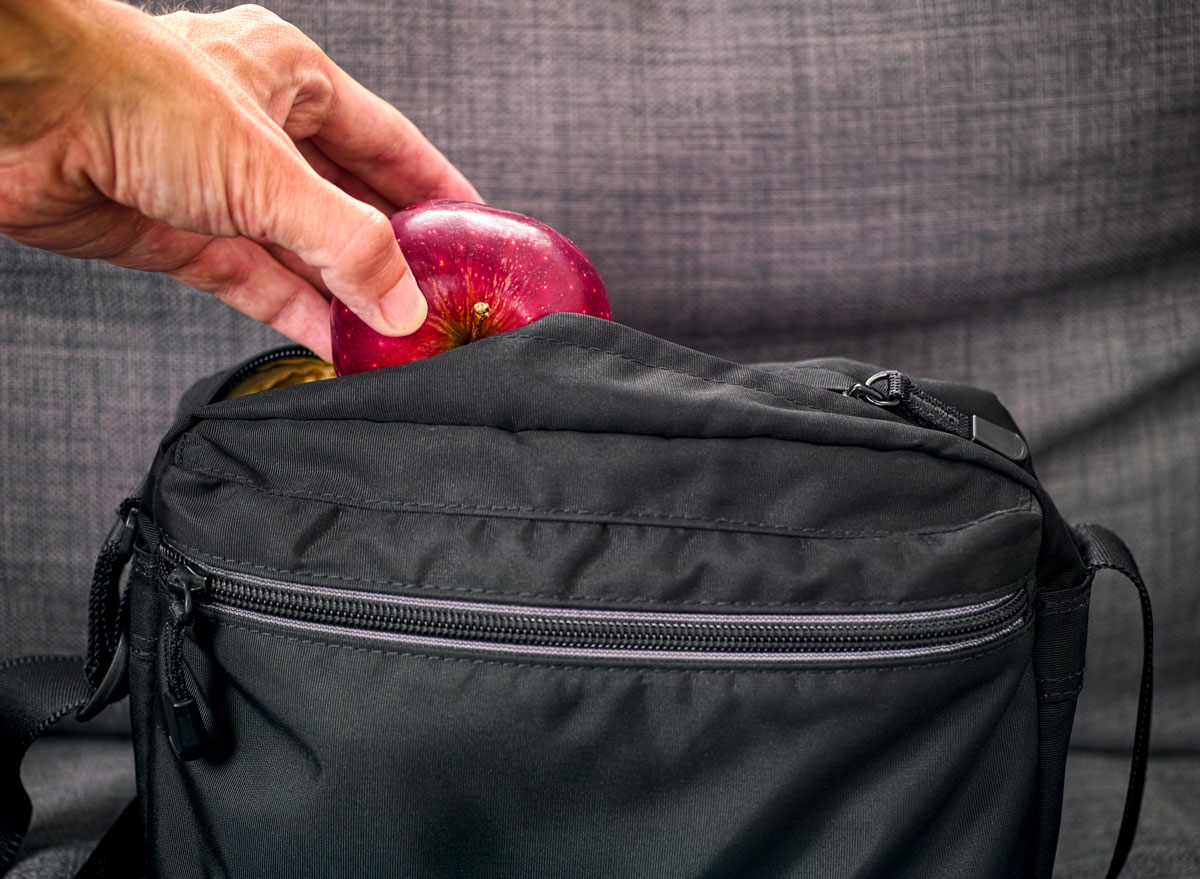
Remember those two snacks we suggested above? Be sure to bring 'em along so you don't have to resort to whatever is within arm's reach come 3 p.m. "Snacking is helpful to curb hunger and control portion sizes when you finally get to your next meal. Pack a banana or apple and pair with an individual packet of nut butter for a filling mid-afternoon snack," Fine says.
Don't drink your calories.
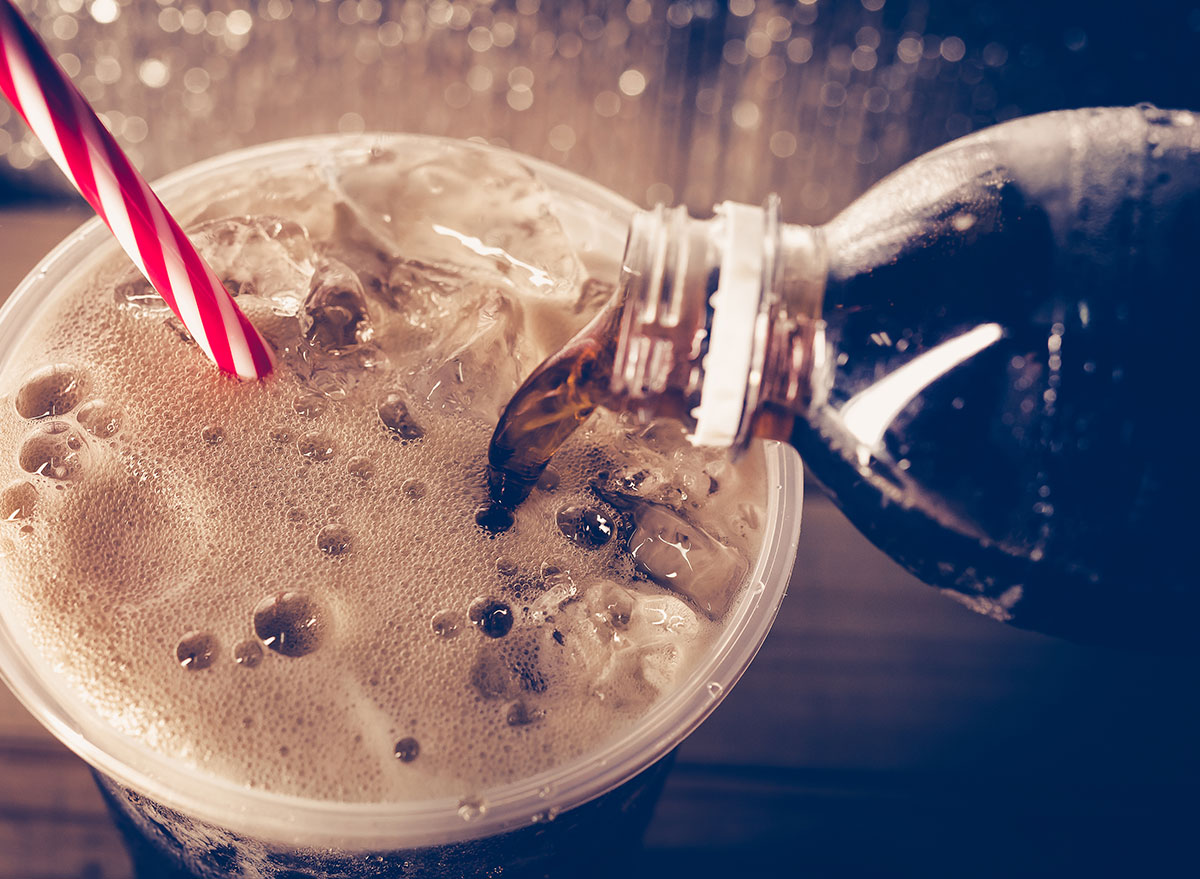
Skip soda, juice, lemonade, and other beverages with added sugar.
"You want to eat your calories not drink them because beverages are not as filling as solid foods. The sensory experience associated with chewing and the rate of digestion is slower and more satisfying with solid foods compared to liquids," Upton says.
Ease up on the alcohol.
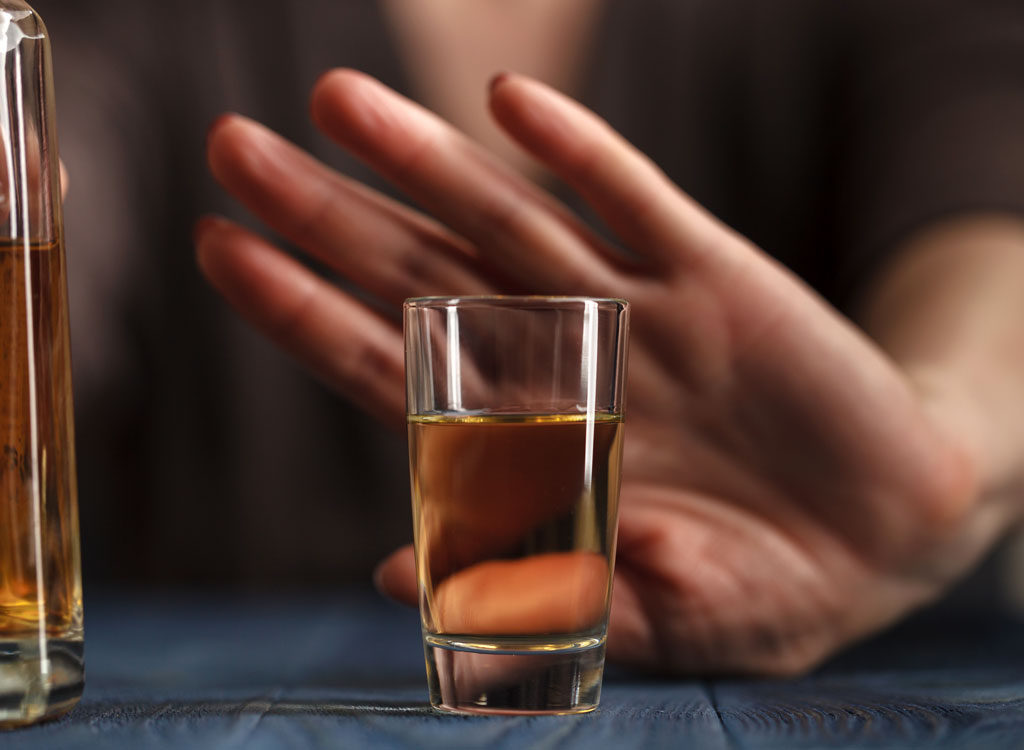
When you do wine about it, do so in moderation. "Alcohol packs in a lot of calories, stimulates appetite, and triggers areas of the brain that make you crave junk food. It's extremely hard for people to maintain a healthy weight if they indulge more than a couple days a week," Upton says.
Introduce a new change once or twice a month, max.
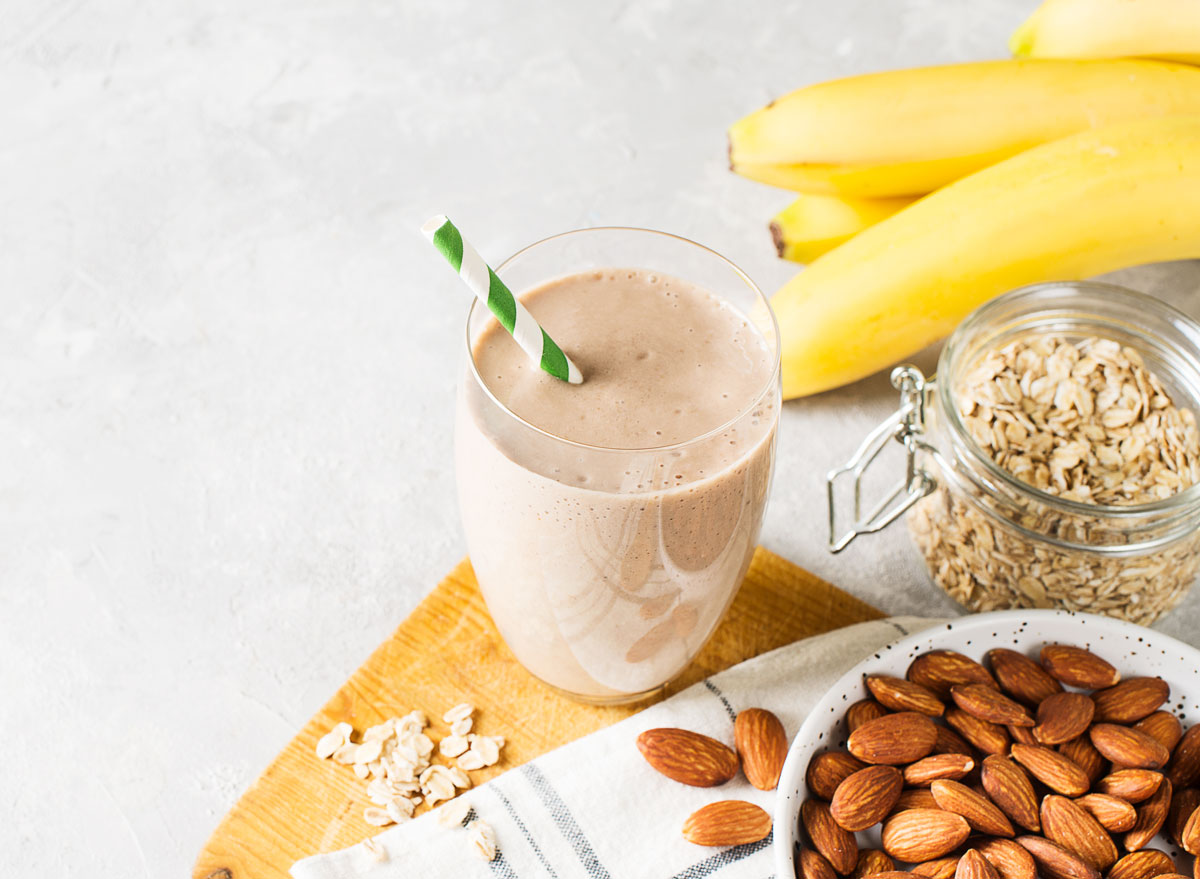
Make just one positive, health-related change to your routine every two to four weeks. "Making small, manageable changes one at a time, then building on each success going forward, enhances self-efficacy," Dixon says. "Self-efficacy is the feeling you can accomplish your goals. It's something you need to increase if you want to reach any goal, including weight loss. Building on each small change so you end up stringing together an entire suite of healthy behavior changes. This is especially important if, in the past, you've tried to drastically overhaul your diet all at once, only to find it's just too much to manage. That type of event decreases self-efficacy. Building on small successes to reach a goal increases self-efficacy."
Combat cravings by distraction.

Use the power of time to manage that internal voice that says, "I must have a pepperoni pizza!" "For most people, cravings wax and wane throughout the day. They can feel really intense for 10 minutes, but then, you get distracted by answering an important email or finishing a work memo. Before you know it, the craving is gone," Dixon says.
You can use this ebb and flow to your advantage. "If a craving hits, I recommend that people 'surf the urge' to eat that junk food. Get a glass of water, take a quick walk, watch a funny, short video clip—anything that will help you get past the desire to eat that bag of cookies or chips right this minute. Some people find it helpful to set a timer for 15 or 20 minutes. Then they busy themselves during that time and when the timer goes off, they check back in. On many occasions, they find the overwhelming desire to eat a particular food has passed," she says.
Say "ciao" to cleanses.
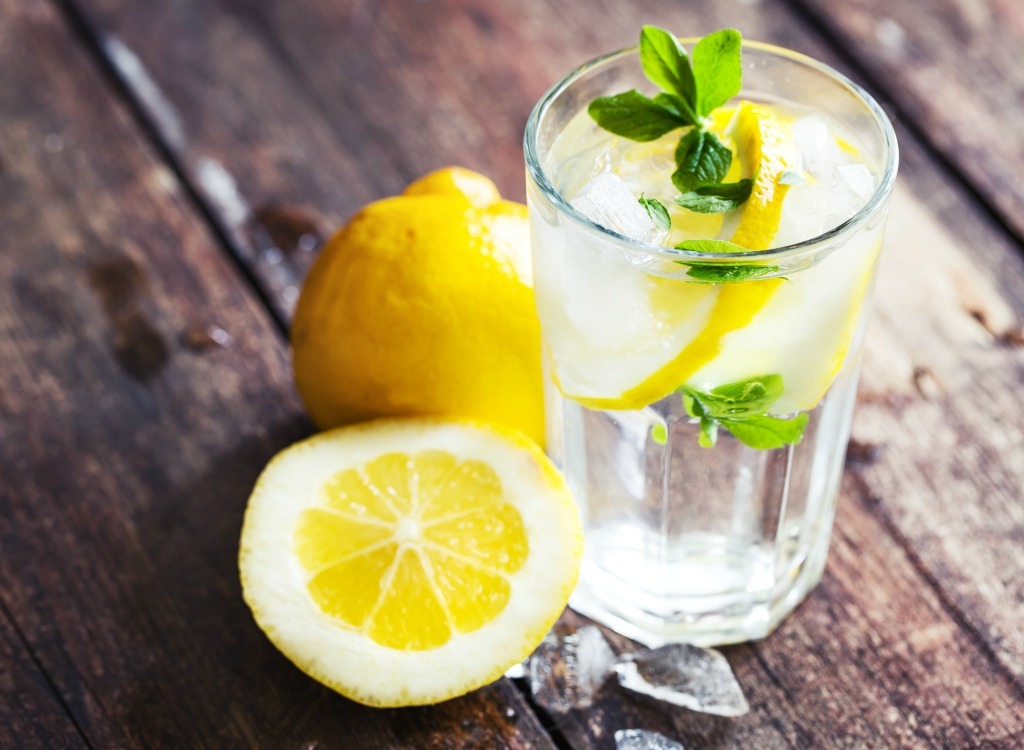
If you do happen to overdo it on a third or fourth slice of that pizza or a cocktail beyond what you had planned ahead for, don't feel like you need to deprive yourself the next day. "Skip the day-after cleanse. Our body is naturally designed to manage its own 'detoxing.' From the liver and skin to our intestines, we are metabolically wired to naturally excrete waste that builds from both natural metabolism and from our environment," Fine says. "Plus, crazy cleanses place havoc on your metabolism with the constant cycle of under-eating and overeating."
Try swapping instead of skipping.
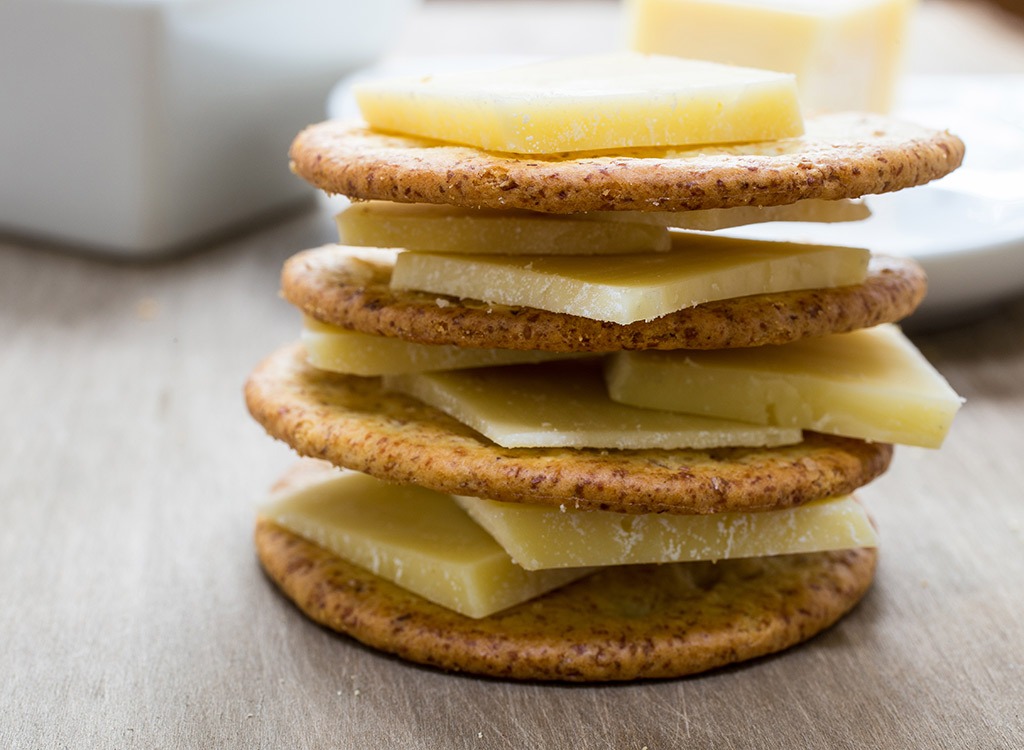
Always snack on a handful of candy at 10 a.m.? "Set yourself up for success by replacing it with a healthier food rather than trying to skip it altogether," Dixon says. "Pack a handful of nuts in your bag. Set them on your desk in the morning, in plain sight. When 'chocolate-o-clock' hits, grab your healthy snack instead." Other swaps to consider would be a chocolate chip protein bar instead of a chocolate chip cookie, an open-faced sandwich instead of a sub, and some cheese and healthy crackers instead of a slice of pizza.
Fill up on fiber.
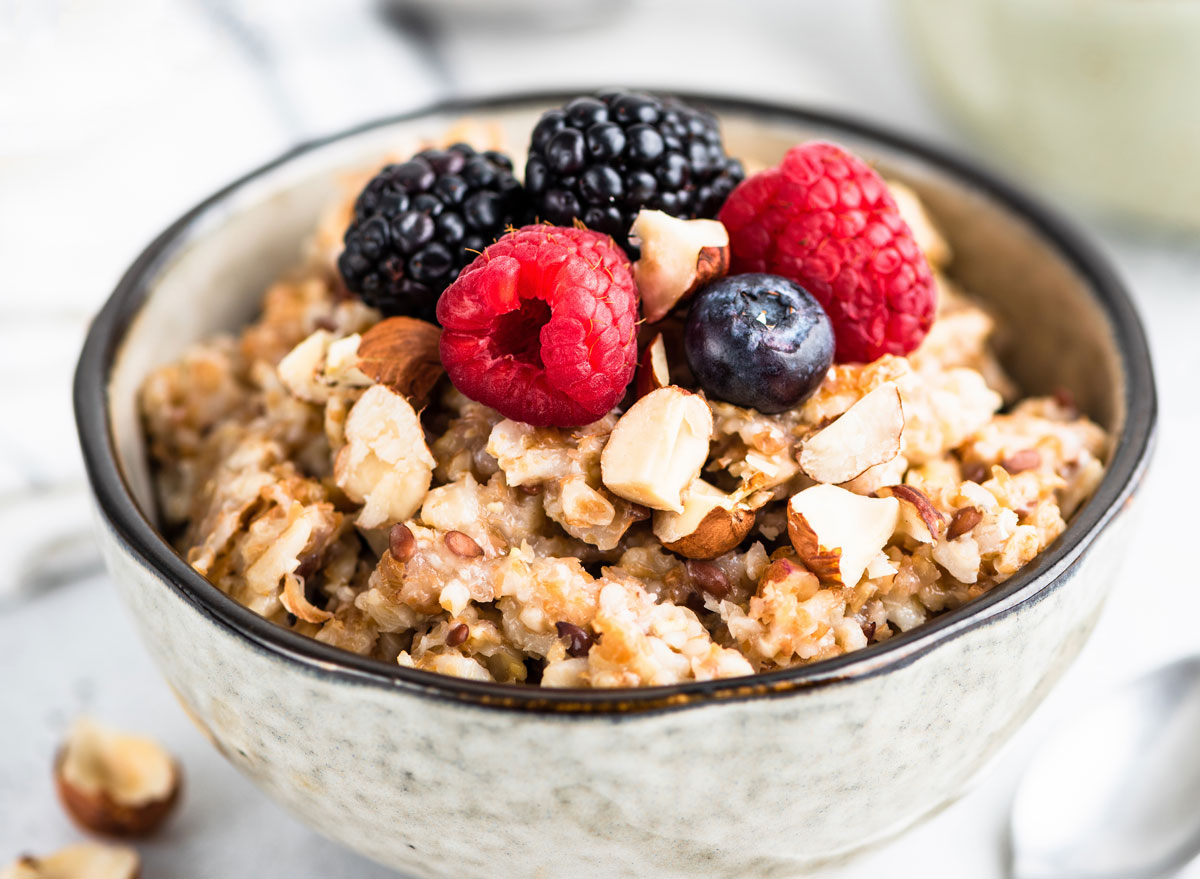
Building on our previous fiber tip, aim to consume at least 25 grams of fiber per day. "More is usually better if you can sneak it in. As Americans, we barely reach half of our fiber goals on a daily basis. Fiber is found is all the plant-based foods that fill us up like fruit, veggies, nuts, beans, seeds and whole grains. In the right portions, these foods should make up most of your daily intake with a few ounces of protein per meal as an accent," Harris-Pincus says.
Find a supportive 'weight loss buddy.'

It's true what they say: There's power in numbers. "Have someone to whom you can be accountable and who will cheer you on and help you get back on track after a setback," Brooking says. This can be in real life or through social media; both have been proven to be beneficial.
Try new recipes every once in a while.
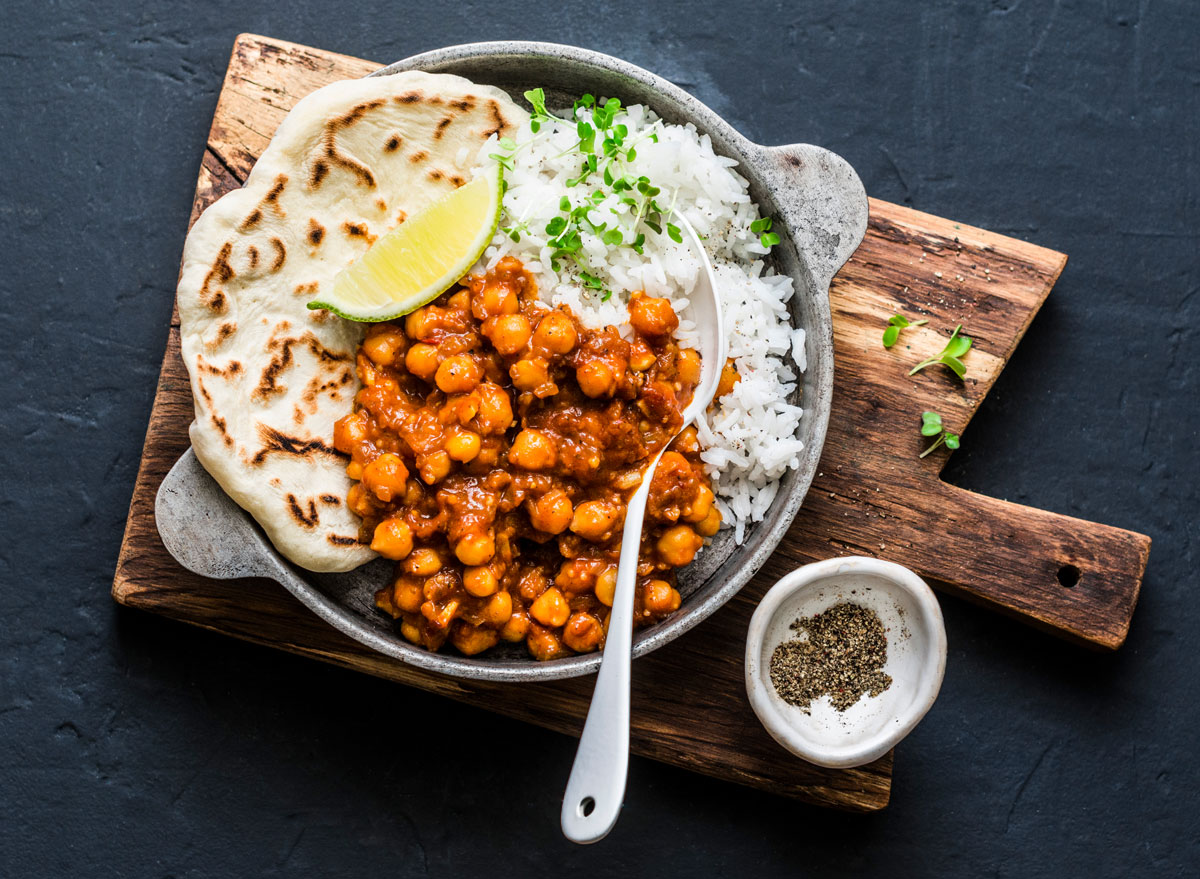
Variety is the spice of life. "The fastest way to burn out is to only eat chicken breast, brown rice, and broccoli," Reaver says. "Find one new recipe per week that you look forward to cooking and eating. Boredom with our options is what drives us to takeout, not lack of food."
Make smart substitutions when baking.
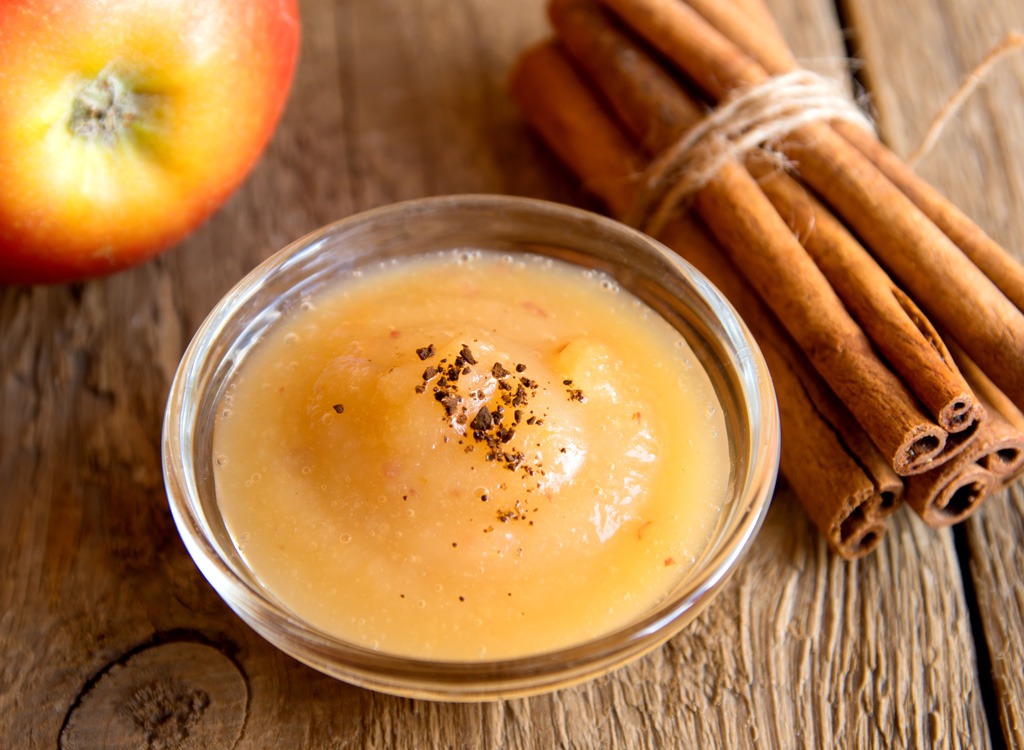
When it's not a family heirloom recipe or your favorite-ever treat, try a savvy swap. "To cut sugar, use applesauce or prune puree to replace half the fat in baked goods. I've experimented and found that you can replace 100 percent of the fat with applesauce in brownies or a moist cake and they'll still come out great," Brooking says.
Related: 20 Sweet Hacks That Will Make You Love Baking
Think of the brain benefits.

Mental health FTW. "Regular physical activity and a healthy diet improve mood and lessen anxiety, according to research published in the journal PLOS One," Dixon says. "So another great reason for your goal of adopting healthier eating habits might be, 'I want to feel good about myself and my life.'"
Carve out time for self-care.

Stress can seriously trip up your efforts on the scale—and beyond. Both sleep and stress are often overlooked when it comes to how to lose weight because they are the more "intangible" aspects of health, but they are oh-so vital to keep tabs on, Reaver believes. "Stress eating is another trap that we can often fall into when trying to lose weight. Make sure your mental health is also a priority," she says. Besides some self-care tips, you can also change your diet to improve your mood. Check out these 21 Best Foods to Eat When You're Stressed, According to Dietitians.
Read about people who've lost weight and kept it off:
Rebel Wilson Says She No Longer Has These 4 Health Problems After Losing 77 Pounds
The #1 Weight Loss Tip From Real People Who Lost 70 Pounds
Every Kardashian Explains Exactly How They Lost Weight Over the Years
